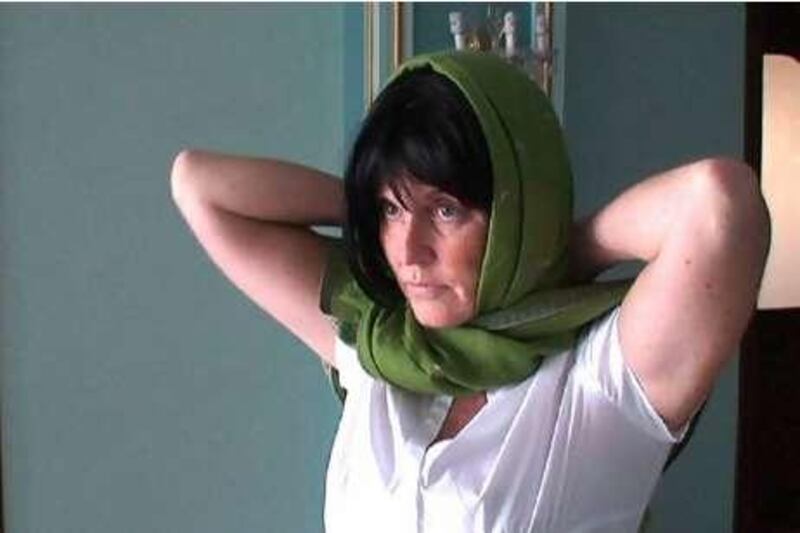ISTANBUL // Sarah Ferguson, a former member of the British royal family, has angered the government of Turkey by secretly visiting orphanages in Istanbul and Ankara and making a film about scandalous conditions there, but Turkish experts say that the film, to air this week, tells the truth about the plight of children in such institutions across the country.
There have been shocking reports about the fate of children in Turkish orphanages before, but the fact that such an international celebrity as the Duchess of York, the former wife of Prince Andrew, the second son of Queen Elizabeth, was involved in exposing a deplorable and embarrassing state of affairs has added a new dimension to the revelations. "The world will see these pictures," the Milliyet newspaper said.
Wearing dark glasses and a headscarf to hide her true identity, the duchess visited the orphanages in September with a reporter and a cameraman of the British channel ITV, who clandestinely filmed the children, some of whom were mentally handicapped. "Many were tied to benches like dogs," Chris Rogers, the ITV reporter, wrote in the British newspaper Daily Mail. "Two women sharing a bed covered in faeces jumped to their feet as we entered the room, excited to have visitors. As they turned they revealed tight nooses around their hands that pinned their arms behind their backs."
At one point, "the duchess's eyes filled with tears", Rogers wrote. The duchess's daughter Eugenie, who accompanied her mother in Istanbul, also burst into tears after visiting the orphanage there. Mr Rogers conceded the group did not get official permission from the Turkish authorities, so he used a fake identification card showing him to be an aid worker; Rogers did not say how the duchess gained access to the institutions. They visited the Saray, or Palace, Rehabilitation Centre near Ankara and the Care and Rehabilitation Centre for the Mentally Handicapped in Zeytinburnu, a district in the European part of Istanbul.
The film is to be broadcast tomorrow, but pictures of children tied to their beds and reports about the duchess's visits have dominated headlines and television news in Turkey since Monday. "Turkey will be shamed," one newspaper commented. "Turkey's image takes a heavy blow," said another. In Ankara, the government reacted with fury. Leading the charge, Nimet Cubukcu, the state minister responsible for women and children, accused the duchess of a politically motivated campaign against Turkey. The "bad intent" behind the film was "most obvious", the minister said in a statement.
Ms Cubukcu referred to the imminent publication of a new report by the European Union on Turkey's progress as a candidate for membership, which is expected today. In an interview with Vatan, a Turkish daily newspaper, she said it was known that "this Sarah" was against Turkey's EU bid. "She has run a campaign against Turkey's EU membership. Now she runs a campaign that says: 'Don't even go to Istanbul as a tourist'." A Turkish expert has been sent to Britain to look at the duchess's film to make sure it does not contain photomontages.
The minister also said that an inquiry into allegations of ill-treatment had been started and that the Turkish public could be certain that any wrongdoing would be punished. The orphanage in Istanbul that had been visited by the duchess opened its doors to the Turkish press on Monday and presented well-fed and happy children in a clean and friendly environment. Vatan reported that authorities had ordered a general clean-up of Istanbul orphanages after reports about the duchess's film surfaced on Monday.
Speaking about the "duchess crisis", as some newspaper called it, Ali Babacan, the foreign minister, criticised the way the film was made. Turkey's ambassador in London conveyed his government's displeasure to the British foreign office, news reports said. While the government attacked the British duchess, opposition politicians, observers and experts in Turkey said the film had exposed problems that had not been solved despite being known to the authorities. Violence and poor conditions in Turkish orphanages have been known to exist before the duchess's visit. Three years ago, Turkish reporters using a hidden camera uncovered a scandal involving severe beatings of children in a state-run children's home in the east Anatolian city of Malatya.
In a parliamentary question directed at Ms Cubukcu, Ozlem Cercioglu, an opposition deputy, said she had visited the Saray orphanage as late as 2004 and had witnessed "similar scenes" like the ones in the duchess's film. Ms Cercioglu said she wanted to know why conditions have not been improved since then and why the people responsible for theses conditions had not been punished. "Does it not make you uneasy that you close your eyes to these and other actions that violate human honour?" her question to the minister reads.
Experts say bad hygienic conditions and a lack of staff were not only problems of the two institutions visited by the duchess. "Conditions in all children's homes in Turkey are very bad," Gurkan Odabasioglu, a child psychiatrist, told the Radikal newspaper. "There is a lack of resources, infrastructure and personnel." For her part, the duchess of York insisted her visits were not publicity stunts, but serious efforts to help children in need. She runs the Sarah Ferguson Foundation, which helps raise funds for charities that help children. Rogers, in his description of the visits, said the duchess took a piece of cloth, which had apparently been used to tie one of the children to a bed, with her from the Saray Centre in Ankara. "This is my inspiration," Rogers quoted her as saying. "I will take this piece of cloth with me to every speech I make about what we found here and I will campaign for change."
tseibert@thenational.ae






